|
|
|
Sort Order |
|
|
|
Items / Page
|
|
|
|
|
|
|
| Srl | Item |
| 1 |
ID:
073056


|
|
|
|
|
| Publication |
2006.
|
| Summary/Abstract |
Chechen-style turmoil is spreading across the rest of the North Caucasus, and the Kremlin seems incapable of coping with the mounting chaos, or even understanding its causes - among them poverty, unemployment, ethnic tensions, corrupt pro-Moscow elites and high-handed policies by local authorities. Islam has become an increasingly powerful political force, and some Islamist groups are unquestionably radical and violent, and seek a sharia-based Caliphate uniting the North Caucasus. Their tactics include assassinations, kidnappings, bombings and armed attacks against towns. But there is a bigger issue at stake. Russia has many millions of Muslims, and xenophobic, anti-Muslim organisations and sentiment are increasingly prominent in the Russian political landscape. The spread of the North Caucasus crisis to other Muslim regions, such as Bashkortostan and Tatarstan, could affect Russia's entire political trajectory.
|
|
|
|
|
|
|
|
|
|
|
|
|
|
|
|
| 2 |
ID:
091870
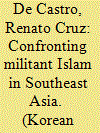

|
|
|
|
|
| Publication |
2009.
|
| Summary/Abstract |
This article discusses the Bush administration's extension of the War on Terror in Southeast Asia and this operation's main objective-the Abu Sayyaf Group (ASG) in the Philippines. It probes the ASG's history, transnational links, and terrorist operations. Then using content analysis, the article analyzes the terrorist group's primary reading material to determine its ideological affiliation with transnational Islamic militant groups. It then argues that the transnational jihadist ideology is evident in the ASG's primary reading material. The material reflects the ideas of the late Palestinian terrorist Abdullah Azzam, and by implication, those of the late Egyptian poet Sayyid Qutb. In conclusion, the article points out that the influence of jihadist ideology on the ASG is superficial, because of the widely held view that the band is a marginalized group operating at the fringes of the mainstream militant Islamic movement in Southeast Asia.
|
|
|
|
|
|
|
|
|
|
|
|
|
|
|
|
| 3 |
ID:
128823
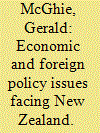

|
|
|
| 4 |
ID:
095298
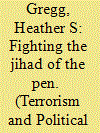

|
|
|
|
|
| Publication |
2010.
|
| Summary/Abstract |
Al Qaeda's ideology is not new; their critique of the existing political and social order and vision for how to redeem the Muslim world builds on preexisting arguments of several 20th century predecessors who called for an Islamic revolution that would create a new order based on Islam. The persistence of revolutionary Islam suggests that these ideas need to be countered in order to strike at the root of the problem driving Islamically motivated terrorism and insurgency. U.S. efforts to defeat Al Qaeda, however, continue to focus primarily on killing or capturing the leadership, interdicting operations, and defensively bolstering the homeland and U.S. assets against various types of attacks. In order to confront Al Qaeda's ideology, U.S. efforts should focus on indirectly fostering "a market place of ideas"-the space and culture of questioning and debating-in order to challenge the grievances and solutions proposed by revolutionary Islam.
|
|
|
|
|
|
|
|
|
|
|
|
|
|
|
|
| 5 |
ID:
095797
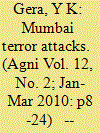

|
|
|
| 6 |
ID:
139341
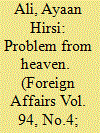

|
|
|
|
|
| Summary/Abstract |
We have a problem—not a problem from hell, but one that claims to come from heaven. That problem is sometimes called radical, or fundamentalist, Islam, and the self-styled Islamic State is just its latest iteration. But no one really understands it. In the summer of 2014, Major General Michael Nagata, the commander of U.S. special operations forces in the Middle East, admitted as much when talking about the Islamic State, or ISIS. “We do not understand the movement,” he said. “And until we do, we are not going to defeat it.” Although Nagata’s words are striking for their candor, there is nothing new about the state of affairs they describe. For years, U.S. policymakers have failed to grasp the nature of the threat posed by militant Islam and have almost entirely failed to mount an effective counteroffensive against it on the battlefield that matters most: the battlefield of ideas.
|
|
|
|
|
|
|
|
|
|
|
|
|
|
|
|
| 7 |
ID:
089510
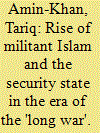

|
|
|
|
|
| Publication |
2009.
|
| Summary/Abstract |
This paper distinguishes between political and militant Islam and analyses the latter's current ability to confront empire and to become a social force in Muslim-majority states. This analysis is within the dialectic of collaboration and resistance, starting with client postcolonial states' pivotal role in bringing to fruition the collaboration between political Islam and US imperialism during the cold war era. The post-cold war period signals the imperialist putsch to confront militant Islam in the 'Long War' by employing the cold war strategy of 'permanent war' and universalising the idea of the security state. Militant Islam's resistance to the Long War and the security state makes this two-pronged imperial strategy a losing proposition for the USA. Paradoxically this strategy has also become the prime mover for militant Islam's ascendancy. The paper addresses the paradox of the USA's continuation with its losing Long War strategy and securitisation agenda which, although providing succour to militant Islam, is also achieving its larger objectives to buttress capitalist globalism; fuel the military-industrial and security-industrial complexes; and support 'big oil'.
|
|
|
|
|
|
|
|
|
|
|
|
|
|
|
|
| 8 |
ID:
076401


|
|
|
| 9 |
ID:
163208
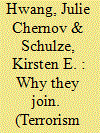

|
|
|
|
|
| Summary/Abstract |
Why do Indonesian Muslims join Islamist extremist groups? This article explores four pathways to entry into Indonesian militant groups: study sessions, local conflict, kinship, and schools. It argues that within all four of these pathways, social bonds and relationships are the common thread in encouraging entry as well as in fostering commitment. Specifically, these relationships contribute to the formation and eventual consolidation of one’s identity as a member of the jihadi group through regular participation in activities, attending meetings, narrowing the circle of friends to those within the group, and participating in increasingly risky and possibly violent activities together. Drawing on original fieldwork including 49 interviews with current and former members of Jemaah Islamiyah, Mujahidin KOMPAK, Darul Islam, Mujahidin Tanah Runtuh, Indonesia’s pro-ISIS network, and other jihadist groups as well as 57 depositions and court documents, this article explores the development and evolution of these pathways and how relational ties play a role in each
|
|
|
|
|
|
|
|
|
|
|
|
|
|
|
|
|
|
|
|
|